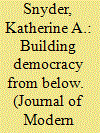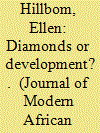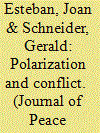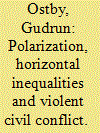|
|
|
Sort Order |
|
|
|
Items / Page
|
|
|
|
|
|
|
| Srl | Item |
| 1 |
ID:
084756


|
|
|
|
|
| Publication |
2008.
|
| Summary/Abstract |
Focusing on events in a rural village in Tanzania during 2001-02, this paper examines the changing nature of state/society relations in Tanzania. Drawing on experience from previous years of fieldwork in the early 1990s, it becomes apparent that villagers are beginning to change the way they engage with the state. These new approaches are framed in part by the discourse of democracy, with which Tanzanians have become familiar since the economic and political liberalisation policies of the 1990s. These events reveal a new sense of the right to participate in decision-making on how to use key development resources. They also illustrate how local elites can threaten to capture benefits for their own gain. As Tanzanians begin to demand more rights to participate in the public sphere, their achievements enlarge our understanding of what might constitute civil society.
|
|
|
|
|
|
|
|
|
|
|
|
|
|
|
|
| 2 |
ID:
084751


|
|
|
|
|
| Publication |
2008.
|
| Summary/Abstract |
Despite decades of police assistance and the recent introduction of reform plans, Nigeria's public police remain notoriously brutal and corrupt. This raises the question of whether even flawed reforms in a relatively democratic environment can make a significant difference to policing standards and practices. Based on developments in the Nigeria Police since 2005, this article suggests that reform can make a normative and organisational difference, but that in the absence of fundamental socio-political change, its effects tend to be superficial, localised and temporary. Reform's dynamic is better understood as a classic dialectic than a serial succession of movements.
|
|
|
|
|
|
|
|
|
|
|
|
|
|
|
|
| 3 |
ID:
084749


|
|
|
|
|
| Publication |
2008.
|
| Summary/Abstract |
Due to its four decades of high long-term economic growth and democratic system, Botswana has been depicted as an exceptional success story in a region full of economic and political failures. In this article, a structural analysis is applied, and it is argued that Botswana's success should be understood as one of pre-modern growth without development. It is claimed that although the country may be a growth miracle, it has not yet experienced 'modern economic growth', characterised by structural change in patterns of production as well as in social and political institutions. Such analysis also offers an explanation for the duality of Botswana's economy and society, since pre-modern growth, as opposed to development, allows for significant poverty rates and extremely unequal resource and income distribution to prevail in the midst of plenty.
|
|
|
|
|
|
|
|
|
|
|
|
|
|
|
|
| 4 |
ID:
084748


|
|
|
|
|
| Publication |
2008.
|
| Summary/Abstract |
Governance reform practice has mostly focused on building up and transforming central state institutions. Furthermore, the politics of aid has often constructed a very 'introverted' politics based in large cities. This article explores the means through which governance ideas are implemented outside this 'governance realm', by looking at the ways in which the Lushoto District government in Tanzania has mediated a range of policy changes that have emanated from the state/donor centre. Identifying three distinct but inter-related repertoires of political practice, it argues that governance at the local level has been largely about financial management, and that this aspect of reform is in tension with local developmentalism and is more starkly opposed to local veranda politics.
|
|
|
|
|
|
|
|
|
|
|
|
|
|
|
|
| 5 |
ID:
084753


|
|
|
|
|
| Publication |
2008.
|
| Summary/Abstract |
Sierra Leone has recently emerged from a long period of political instability and civil war, and is ranked among the world's poorest countries. Thousands of displaced people are in the process of returning to their villages to rebuild their mainly farming-based livelihoods, and many are growing food crops for the first time in a decade. With pressure on food production increasing in rural areas, the inland valley swamps have been identified by the government as a vital resource for sustaining rural livelihoods and achieving food security through the production of rice and other commodities. However, previous government policies directed at enhanced wetland production have largely failed to achieve their goals, and have been criticised for neglecting the institutional challenges of development. Drawing on recent fieldwork carried out in two rural communities in the Eastern Province, this paper considers how institutional arrangements function in Sierra Leone's swamp wetlands, and explores how stresses associated with a post-conflict environment are shaping land-use decisions and mediating access to resources in new ways. The findings of the enquiry have implications for Sierra Leone's recently adopted commitment to decentralisation, a move that has, in theory, seen the state strengthen its position at the local level, and will allegedly create new spaces for increased interaction between state agencies, traditional leaders and communities. Two institutional challenges are examined - access to land and access to labour - that must be addressed if decentralised reforms to resource management are to be effective for wetland rice production. The analysis concludes by considering one recent initiative at the forefront of efforts to decentralise the Ministry of Agriculture, the 'Agricultural Business Unit' (ABU) initiative, to elucidate some of the challenges faced in post-conflict wetland rehabilitation.
Correspondence:
|
|
|
|
|
|
|
|
|
|
|
|
|
|
|
|
| 6 |
ID:
080981


|
|
|
|
|
| Publication |
2008.
|
| Summary/Abstract |
Recent formal and empirical research in political science and economics strongly indicates that various forms of political and social polarization increase the risk of violent conflict within and between nation states. The articles collected for this issue explore this crucial relationship and provide answers to a variety of topics: First, contributors address how institutions and other contingent factors mediate the conflict potential in polarized societies. Second, this special issue compares the explanatory power of income polarization with traditional and new measures of inequality. Third, the contributions examine how groups form and coalitions are built in polarized societies and how this affects political decision-making. Finally, the special issue analyses the interconnections between interstate war, internationalized conflict and polarization. This introduction synthesizes the literatures that have been developed on the issue of polarization and conflict in the various social scientific disciplines. The authors particularly discuss the similarities between economic models of conflict and the so-called crisis bargaining literature which has been mainly developed within political science. The article shows the differences between `polarization' and `inequality' and introduces the various measures of diversity that have been used in the study of interstate and intrastate conflict during the past few decades.
|
|
|
|
|
|
|
|
|
|
|
|
|
|
|
|
| 7 |
ID:
080983


|
|
|
|
|
| Publication |
2008.
|
| Summary/Abstract |
This article provides a theoretical framework that distinguishes between the occurrence of conflict and its severity, and clarifies the role of polarization and fractionalization in each of these cases. The analysis helps in ordering the various definitions, and in providing explanations for the empirical observations on the relationship between conflict, on the one hand, and polarization or fractionalization, on the other. The behaviour of players in conflict is described as a game, and equilibrium payoffs to all players are computed. The status quo is characterized by a set of political institutions that channel the different opposing interests and turn them into a collective decision, with a second set of payoffs. Groups rebel against the status quo political institution whenever the latter set of payoffs is dominated by the former. When society is highly polarized, the potential cost of rebellion is extremely high, and this cost may serve as the guarantor of peace. So, in highly polarized societies, the occurrence of open conflict should be rare but its intensity very severe, whenever it happens. On the other hand, highly fractionalized societies are prone to the occurrence of conflict, but its intensity will be moderate. It matters, therefore, whether one studies the intensity of conflict, conditional on conflict breaking out, or the likelihood that conflict actually occurs. Specifically, it is shown that: (i) measures of fractionalization and polarization tend to run in opposite directions, (ii) the onset of conflict critically depends on the political system in place, (iii) the occurrence of conflict and the intensity of conflict also tend to move in opposite directions, (iv) the relationship between polarization or fractionalization and conflict is non-monotonic and (v) the intensity of conflict depends positively on the degree of polarization
|
|
|
|
|
|
|
|
|
|
|
|
|
|
|
|
| 8 |
ID:
080982


|
|
|
|
|
| Publication |
2008.
|
| Summary/Abstract |
Recent large-N studies of civil war conclude that inequality does not increase the risk of violent conflict. This article argues that such conclusions may be premature because these studies, which usually test the conflict potential of `vertical inequality' (i.e. income inequality between individuals), tend to neglect the group aspect of inequality. Case studies suggest that what matters for conflict is a concept closely linked to both economic and ethnic polarization: `horizontal inequalities', or inequalities that coincide with identity-based cleavages. Horizontal inequalities may enhance both grievances and group cohesion among the relatively deprived and thus facilitate mobilization for conflict. This article provides a quantitative test of this argument, exploring whether various forms of polarization and horizontal inequalities affect the probability of civil conflict onset across 36 developing countries in the period 1986-2004. National household data from the Demographic and Health Surveys (DHS) are used to construct measures of ethnic, social and economic polarization, as well as vertical and horizontal inequalities along two dimensions: social and economic. The article also introduces a combined measure of ethnic/socio-economic polarization as an alternative to the horizontal inequality measure. Robust results from panel and cross-section analyses show that social polarization and horizontal social inequality are positively related to conflict outbreak. Variables for purely ethnic polarization, inter-individual inequalities and combined ethnic/socio-economic polarization are not significant.
|
|
|
|
|
|
|
|
|
|
|
|
|
|
|
|
| 9 |
ID:
084754


|
|
|
|
|
| Publication |
2008.
|
| Summary/Abstract |
This article examines political corruption and political party financing in multiparty Kenya. It uses the Goldenberg and Anglo-Leasing mega-scandals to demonstrate the existence of political corruption, particularly campaign financing, arguing that it has increased under multiparty rule and affected the nature of governance. It has adversely affected political participation and competition, the rule of law, transparency and accountability. Illegal funds to finance the Kenya African National Union's elections in the 1990s were raised through the Goldenberg Affair, whereas those aimed at financing the National Rainbow Coalition's elections in December 2007 were to be raised through the Anglo-Leasing scandal. Corrupt campaign financing, therefore, poses a threat to democracy in the country. The democratic space created and expanded by multipartyism has, however, provided new opportunities for waging the war against corruption. It is in the context of these arguments that the conclusion raises broader issues for corruption and democracy in Africa.
|
|
|
|
|
|
|
|
|
|
|
|
|
|
|
|
| 10 |
ID:
084757


|
|
|
|
|
| Publication |
2008.
|
| Summary/Abstract |
Government and civil society leaders in African transitional states often use rituals and expressions inspired by tradition to facilitate the integration of ex-combatants and displaced people. In Sierra Leone, the expression 'There's no bad bush to throw away a bad child', conveys a vision of African society as inherently forgiving and inclusive, and of Africans as needing to be amongst their own people. This ideal was perfectly suited for the needs of an impoverished state seeking to ease the strain on cities, and relying on communities' organic capacities to absorb their own people. This research draws on interviews with diverse Sierra Leoneans to examine the assumptions behind this communitarian ideal. It argues that while 'There is no bad bush … ' promotes a form of reconciliation defined as peaceful coexistence, it lacks the elements of justice required for deep reconciliation to occur.
|
|
|
|
|
|
|
|
|
|
|
|
|
|
|
|
|
|
|
|
|